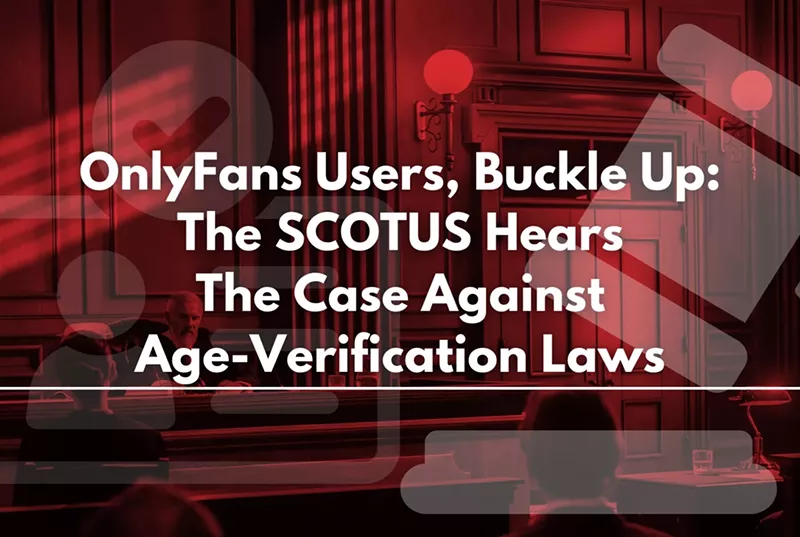Everything’s Bigger in Texas, Including Internet Restrictions
A Texas law (HB 1181) requiring age verification for adults-only sites is going before the Supreme Court to determine whether it is constitutional. Advocates of this law say it will protect children from exposure to pornography on the internet, but opponents are concerned that the law poses a significant risk to privacy and freedom of speech. For all the noise being made about the case, one key point is getting lost in the shuffle: aren’t parents the ones who are responsible for protecting their children online?
The basic premise of the law is that sites with over one-third sexually explicit material must verify that users are 18 years old or older. Verification methods include digital IDs, government-issued IDs, or third-party age-verification services. The penalties for failing to comply are hefty. Sites could be fined up to $10,000 per day if they don’t have verification measures in place, so digging in their heels and saying “nuh uh!” isn’t really an option if the law is upheld. The law gives assurances of privacy but also contains vague language surrounding data security protections, alarming both free-speech advocates and citizens concerned about privacy.
Why are privacy advocates so worried about age verification? Most adults accessing adults-only sites like OnlyFans or Pornhub don’t exactly broadcast that that’s what they’re doing. Generally speaking, when logging into an adults-only site in pursuit of explicit content, anonymity is preferred. Being forced to present personal information in order to access content puts that information at risk of a data breach and places users at risk of data misuse by verification systems. It’s common knowledge now that many companies sell user data to make a buck, allowing them to target consumers based on their online activities. The lack of safeguards for stored information after the verification process is alarming and sets the stage for bad actors to access lists of people who don’t want it publicly known that they log into a specific OnlyFans page every Wednesday night.
There are also concerns that, due to vague language in the law, those who produce explicit content and those who consume it could be criminalized in states trying to impose these restrictions. Forcing people to enter sensitive information into a login screen in order to access the content behind it provides entities pursuing legal action against creators and consumers with a concise list of targets. These kinds of concerns may seem extreme but are not entirely out of the realm of possibility.
All of the above has the same result: adults will likely cut down on content consumption in order to avoid logging in and exposing themselves to these risks. When fewer adults are logging into adults-only sites, children aren’t being protected from harm so much as harm is being caused to real people. Adults who create content for sites like OnlyFans rely on their audience showing up in the form of subscription fees and tips to make a living. When their audience stops showing up out of fear and a desire to protect themselves, the content creators are the ones who pay the price. Given that these kinds of restrictions disproportionately impact marginalized communities—members of the LGBTQIA+ community are frequently targeted with false messaging that suggests they harm children—it creates an especially sticky situation.
When you initially look at HB 1181, it seems like a good idea on the surface! Who doesn’t want to keep children safe? But when you take a closer look at the text, you realize it’s not actually doing much to protect young eyes from what they can find online if left unsupervised. Written into the law are exemptions for search engines and social media platforms. Guess what you can easily find using both of those? That’s right: explicit content. Explicit material isn’t just on sites targeted by the Texas law—those sites are simply the ones that work to keep a barrier around it via paywalls, partially because that has proven to be an effective way of keeping young eyes elsewhere. Framing a law that has the potential to widely suppress free speech as something necessary to protect our children, when it isn’t actually shielding them from what it claims to, is… certainly a choice.
You have to give points to lawmakers for attempting to play on public fears for children’s safety online. But before giving them more credit than they deserve, have you forgotten about parenting? Parental involvement has proven to be the most effective way to keep children safe when they’re active online. Regularly updated parental controls on digital devices, content filters, and open conversations between parents and children about internet use are all proven methods for cutting down on exposure to explicit content and dangerous interactions. Very practically speaking, infringing on adult rights for the sake of protecting minors online isn’t an effective solution. For one thing, if there’s anyone who will find a technological workaround for something they’ve been told they can’t have, it’s teenagers with low supervision and high access to technology. There’s also already a precedent set by the Supreme Court with the 2004 decision in Ashcroft v. ACLU, which emphasized less restrictive solutions for explicit content online, such as filtering software and parental monitoring systems. Those solutions have only become more sophisticated, so why are they suddenly not considered enough?
Sacrificing privacy and free speech under the guise of protecting children is a slippery slope, and one that would be tricky to course-correct if put into place. Protecting children online is a real responsibility, but putting the onus on adults-only platforms and the content creators who rely on them for income isn’t the solution. Parents bear the bulk of the responsibility for protecting their children, and the internet is no babysitter. Regardless of how the Supreme Court rules, we can only hope that continued calls for thoughtful solutions—those that hold the protection of children and the safeguarding of constitutional rights with equal reverence—will be heard and answered.
This post was originally published on this site be sure to check out more of their content.







